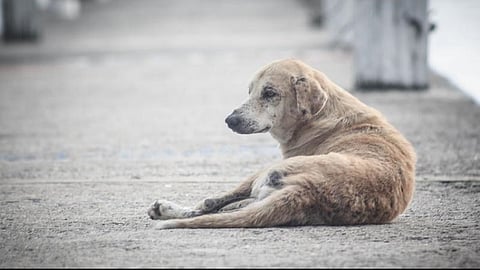

Follow TNM's WhatsApp channel for news updates and story links.
The Karnataka government on Wednesday, November 19, revised its compensation order for injuries and deaths resulting from street dog bites within the Greater Bengaluru Region. According to the new directive, the families of individuals who die due to dog bites or rabies caused by a street dog bite will receive a compensation of Rs 5 lakh from the state government. This new order revises the payment mechanism outlined in a similar order passed in 2023.
The government also detailed the compensation to be paid for non-fatal injuries. A person who suffers skin punctures, deep bruising with punctures and lacerations, or multiple bite injuries from stray dogs will be paid a total compensation of Rs 5,000. Of the total Rs 5,000, Rs 3,500 will be paid directly to the victim by the Urban Development Department (UDD), and the remaining Rs 1,500 will go to the Suvarna Arogya Suraksha Trust (SAST) to cover treatment-related expenses.
This revised payment process is intended to ensure private hospitals do not deny treatment by ensuring the victim gets immediate compensation for initial expenses.
All municipal corporations falling under the Greater Bengaluru Authority (GBA) are required to set up a Verification and Compensation Disbursement Committee to assess cases and distribute the compensation.
In a related move last week, the Karnataka government amended the Karnataka Private Medical Establishments (KPME) Act, 2007, to strengthen legal provisions ensuring timely and lifesaving treatment for dog, animal, and snake bite victims. The amendment followed the Supreme Court’s November 7 directions in a suo motu writ petition regarding uniform access to anti-rabies treatment and emergency care across all hospitals.
Invoking its powers under Section 11B of the KPME Act, the state inserted a new clause into the Patients’ Charter, which mandates that every private medical establishment must administer necessary first aid and provide lifesaving or stabilising emergency measures to all snake bite or dog/animal bite victims without insisting on advance payment.
The provision makes such hospitals eligible for reimbursement from the state government through the District Registration and Grievance Authority, at rates admissible under the SAST scheme.
The Health Department also issued a circular directing all government and private hospitals to maintain a mandatory, continuous stock of Anti-Rabies Vaccines (ARV), rabies immunoglobulin, and Anti-Snake Venom (ASV) at all times, in line with the Supreme Court’s direction for compulsory availability of anti-rabies treatment across all health facilities.
Declaring rabies a notifiable disease in the state, the government instructed all hospitals to ensure timely administration of ARV and a one-time dose of equine rabies immunoglobulin free of cost.
The government further cautioned that failure to comply with these obligations, particularly in cases leading to death, would constitute medical negligence, potentially leading to criminal action under Section 106 of the Bharatiya Nyaya Samhita, or license revocation for serious or repeated violations.
Under the Karnataka Good Samaritan and Medical Professional Act, 2016, all hospitals must provide free screening, first aid, and essential stabilising treatment, stabilising the patient before referring them if the facility lacks adequate resources.